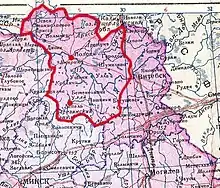201st Security Division
The 201st Security Division, originally the 201st Security Brigade, was a German Army rear-area security division of World War II. The unit was deployed in German-occupied areas of the Soviet Union, and was responsible for large-scale war crimes and atrocities including the deaths of thousands of Soviet civilians. It was disbanded in January 1945
| 201st Security Division | |
|---|---|
| 201. Sicherungs-Division | |
 | |
| Active | 1941–1944 |
| Country | |
| Branch | Army (Wehrmacht) |
| Type | Security division |
| Size | Division |
| Engagements | World War II |
Operational history
Formation
The division was formed in June 1942 on the basis of the 201st Security Brigade.[1] The brigade had been deployed on the Eastern Front during Operation Barbarossa, the 1941 invasion of the Soviet Union, and operated in the occupied regions of the Soviet Union behind Army Group Centre's front lines. While a brigade the unit participated in the murder of Jewish civilians alongside Einsatzkommando 9 of Einsatzgruppe B.[2]
Operations
Upon formation, the division operated in the Vitebsk-Polotsk region of the north-western Belarus. Its duties included security of communications and supply lines, economic exploitation and combatting (partisans) in the Wehrmacht's rear areas.[3] The so-called anti-partisan operations in "bandit-infested" areas amounted to the destruction of villages, seizure of livestock, deportation of the able-bodied population for slave labour to Germany, and the murder of those of non-working age.[4]
In September 1942 the division reported killing 864 "partisans in combat" and handed over 245 individuals to the Wehrmacht's Secret Field Police for execution, while suffering 8 dead and 25 wounded itself. Only 99 weapons (rifles, machine-guns and pistols) were seized.[4] In early 1943, the division carried out operations Schneehase, Kugelblitz and Donnerkeil, which resulted in the death of 2,737 "bandits". In the same period, the unit reported 109 German troops killed in action.[5]
The division was sent to front-line duty in February 1943. The unit was largely destroyed during the Soviet Red Army summer offensive Operation Bagration in 1944, with only the staff and supply troops retreating north. In August 1944, it returned to rear-area security operations and spent the rest of its existence in the rear area of the Army Group North. It was disbanded in January 1945.[1]
See also
References
Citations
- Mitcham 2007.
- Megargee 2009, p. 1719.
- Shepherd 2003, p. 70.
- Shepherd 2004, p. 124.
- Shepherd 2003, p. 54.
Bibliography
- Megargee, Geoffrey P., ed. (2009). The United States Holocaust Memorial Museum Encyclopedia of Camps and Ghettos, 1933–-1945. Vol. 1. Bloomington: Indiana University Press. p. 731. ISBN 978-0-253-35328-3.
- Mitcham, Samuel W. (2007). German Order of Battle: 1st-290th Infantry Divisions in World War II. Mechanicsburg: Stackpole Books. ISBN 978-0-8117-3416-5.
- Shepherd, Ben H. (2004). War in the Wild East the German Army and Soviet Partisans. Cambridge, Massachusetts: Harvard University Press. ISBN 0674043553.
- Shepherd, Ben H. (2003). "The Continuum of Brutality: Wehrmacht Security Divisions in Central Russia, 1942". German History. 21 (1): 49–81. doi:10.1191/0266355403gh274oa.
Further reading
- Beorn, Waitman Wade (2014). Marching into Darkness: The Wehrmacht and the Holocaust in Belarus. Cambridge: Harvard University Press. ISBN 978-0674725508.
- Marston, Daniel; Malkasian, Carter, eds. (2011). Counterinsurgency in Modern Warfare. London: Bloomsbury Publishing. ISBN 978-1849086431.
- Rutherford, Jeff (2014). Combat and Genocide on the Eastern Front. Cambridge: Cambridge University Press. ISBN 978-1107055711.
- Shepherd, Ben H. (2016). Hitler's Soldiers: The German Army in the Third Reich. New Haven, Connecticut: Yale University Press. ISBN 978-0300179033.